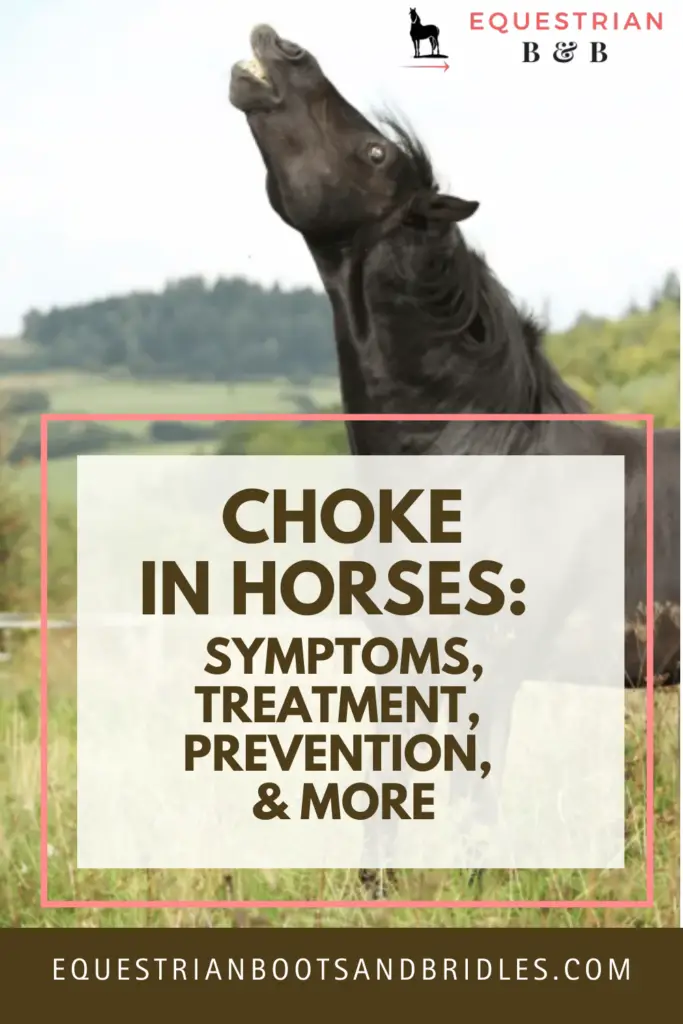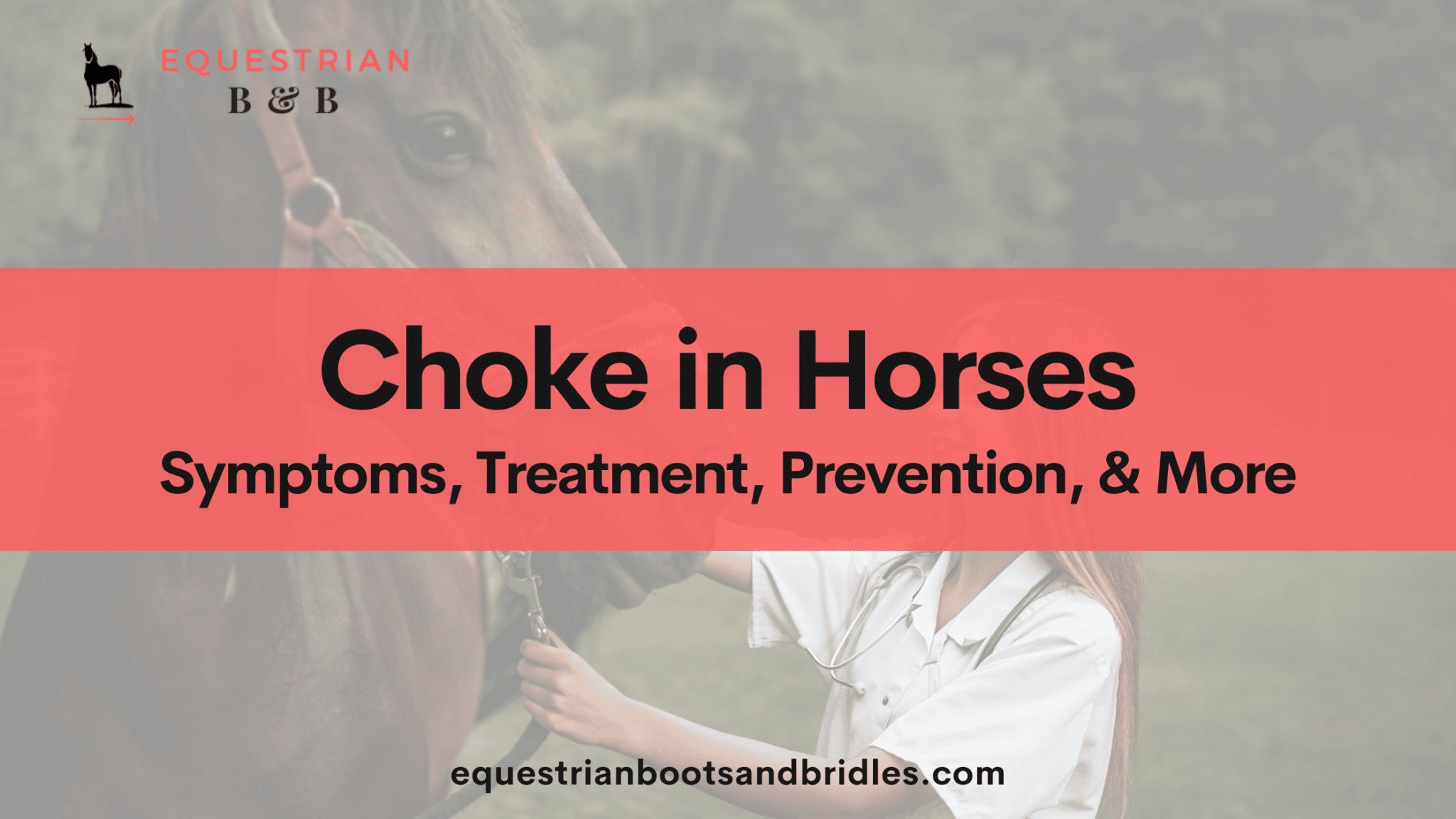It’s one of the scariest situations for any horse owner to find themselves in: to find their horse choking in their stable or pasture. Choke is usually easy to spot: food-filled mucus streaming down the horse’s nose, severe contractions of the throat, gagging action, and a wide-legged stance.
But what do you do when it happens? Why does it happen? How do you prevent choke? And what is the right treatment when it does happen?
Read on for an in-depth guide to equine choke management.
Disclaimer: In the event of your horse having choke or showing signs of choke, it’s always best to call your vet for advice on how to proceed. The information in this article is to inform, not diagnose or treat equine choke, and you use the information herein at your own discretion.
What Is Choke in Horses?
Horse choking is essentially the same thing as human choking. Because of the differences in anatomy, however, you may have more time to deal with a horse choking than you would for a choking human.
Horses may develop a potentially fatal condition where the esophagus becomes packed with food particles, which creates a barrier that prevents food from moving down the digestive tract.
Essentially, horse choke is a blockage between the mouth and the stomach opening. This blockage is made by food stuck in the esophagus. The horse can’t swallow properly, compacting the food, which worsens the condition further.
Medical intervention is required to help the horse pass the food into their stomach or remove the blockage.
Why Does Choke Happen to Horses?
Choke happens to horses since they can’t vomit. Horses have such a long throat that they can’t regurgitate their food if it becomes stuck, causing the food to simply stick in their throat.
There are several reasons why horses may experience this painful and often fatal condition, including:
- poor diet
- dehydration
- large food particles
- bad or sharp teeth
- obstruction in the throat due to something they swallowed
- damage from injury or impact
- and more
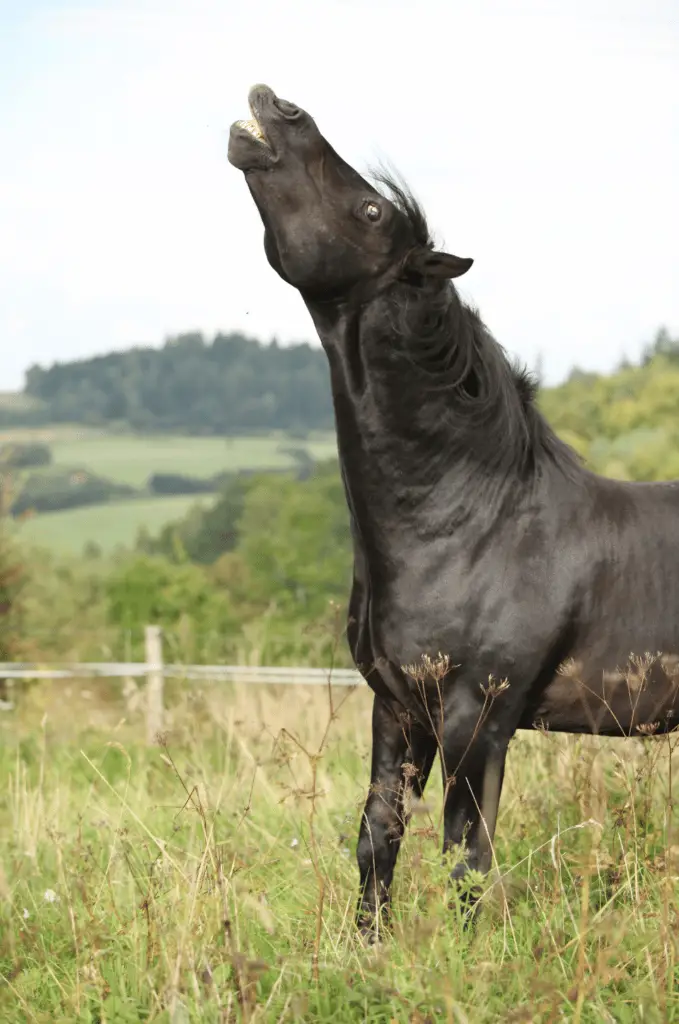
Signs of Horse Choke
Seeing a horse that’s uncomfortable may not scream “choke” at you quite like a horse with slimy mucus dripping out of their nose does, but there are subtle signs of choke to also watch out for.
Here are some typical signs that a horse may be experiencing choke:
Not Eating
One of the first signs you may notice of horse choke is that the horse stops eating. A horse that has a blocked esophagus won’t want to eat any more, and in extreme cases, you may see food coming out of their nose and mouth in a thick slimy goo.
Difficulty Swallowing or Gagging
The horse’s esophagus may go into spasm from pain, and they may show this as a type of swallowing behavior that will spasm down their neck. It will instantly remind you of someone gagging. Their neck muscles will contract painfully, and they will try to forcefully expel the obstruction.
In mild cases, their neck may be tight and tense, with an absence of swallowing action.
Heave Lines
Choke is a painful condition, and horses experiencing it will be in excruciating pain. As a result, their stomachs may tuck in, creating heave-lines along their sides. Owners often mistake choke for simple colic, and even though horses with choke can colic, not all colic cases are choke.
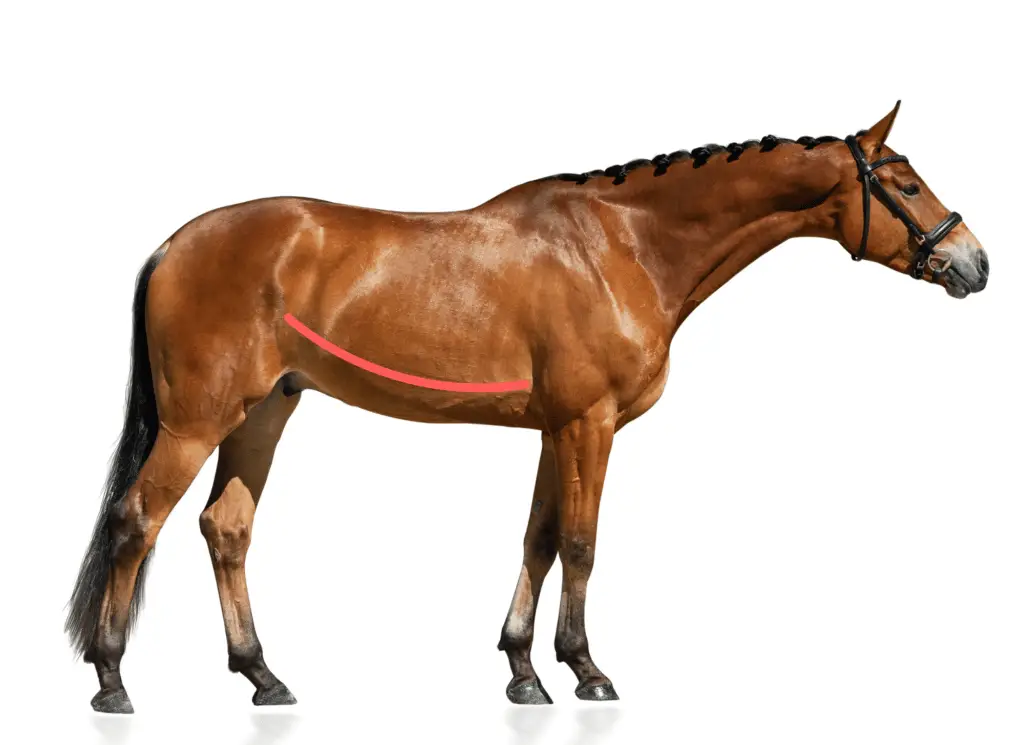
Colic
Colic can be brought on by pain, and the choke can develop into a secondary colic incident. Treating the choke will usually also help alleviate the colic.
Because of colic pain, the horse may try to lay down or roll, which can create further challenges such as a twisted gut, injuries, and further compaction of the blockage.
You can read this article to learn more about colic.
Head Lowering
Trying to dislodge the food buildup, a horse may raise and lower their head, much in the same way a horse that wind-sucks does. There may be quite a bit of licking and chewing going on with this action as the horse’s salivary glands will become hyper-stimulated. This results in the typical nasal discharge.
Distress
The distress the horse is in will be clear to see. In mild cases of choke, a horse may simply seem “off.” This is where knowing your horse’s behavior and nature is important, as you’ll be able to tell when they aren’t being themselves much more easily.
Facial Muscle Spasms
Since the choke can cause swelling that will create pressure on nerves in the throat, there may be facial contortions and spasms that can also indicate their pain and discomfort. Some horses grind their teeth in pain, while others (who have usually weakened from pain or a prolonged choke) may simply hang their jaws or stand with pinched lips.
Pawing
Agitation is to be expected when a horse is in so much pain, so pawing is likely. Turning in their stable or stall will also be a sign of discomfort.
Head Shaking
Standing with their head to one side, chewing strangely (and sideways), and head shaking can be a sure sign of choke or discomfort. The horse is doing everything it can think of to loosen the food blockage and pass it down their throat. They literally try to shake it loose.
Coughing
When the choke is in the upper half of the throat, some horses may try to cough up the food. If they start this reaction as soon as the blockage forms, they may be able to loosen some of the food and expel it.
Hardened Neck Muscles
The friction and pain of the blockage will trigger inflammation, causing the throat muscles to become swollen. As a result, the neck swells rapidly, especially down the front of their neck. This swelling feels like concrete in their throat when you run your palm down their neck.
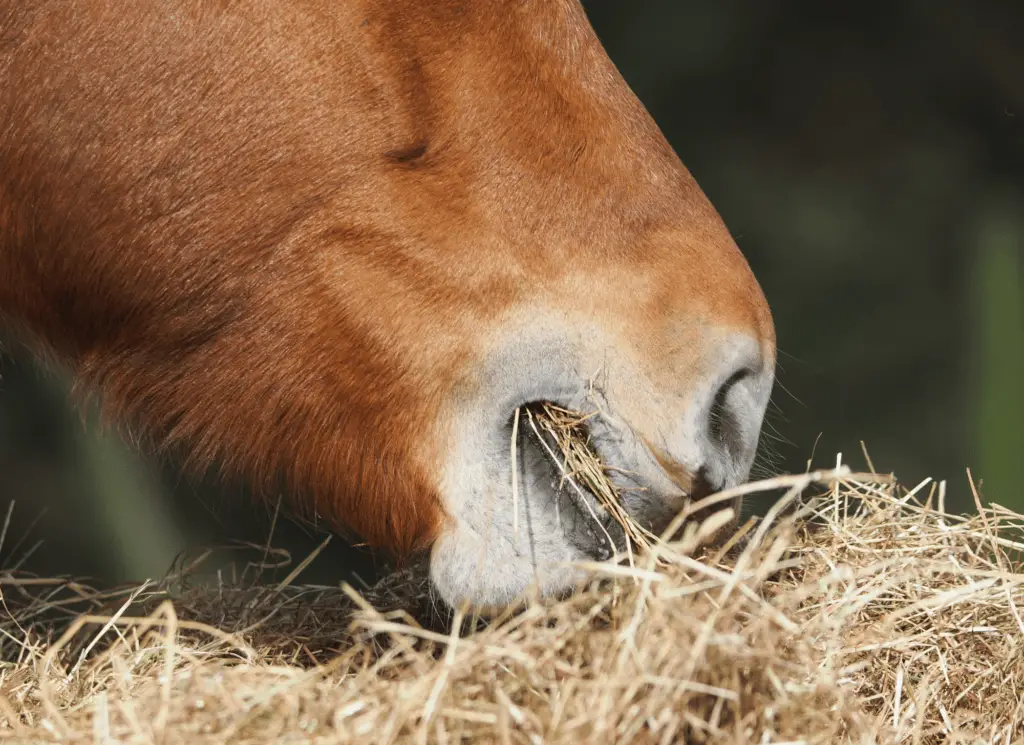
8 Causes of Choke in Horses
Prevention is better than cure, so let’s look at some of the reasons a horse may suffer choke:
1. Large Food Particles
Horses often suffer choke when their feed contains large particles or pellets that don’t encourage proper chewing. The particles compact and form an obstruction in the throat.
2. Eating Too Quickly (Gobbling)
Like humans, horses also need to chew properly and masticate their food (mix food and saliva) to create a suitable texture they can swallow. When a horse eats too quickly from excitement or because they are out of breath (such as a horse that ran in from the fields and began eating while they were still huffing), their food won’t be chewed properly.
Food is swallowed with a mix of air and food, creating a mass that sticks to the sides of the esophagus. The food ball lodges and becomes unswallowable.
3. Not Chewing Properly
Horses may chew poorly for a number of other reasons, such as suffering an abscess in their mouth or having sharp teeth. The discomfort of these conditions may prevent the horse from chewing properly, which will lead to a dry mass of food being swallowed (until it gets stuck).
4. Esophageal Obstruction
A pre-existing obstruction may also stop food from passing down the throat, no matter how nicely the horse chews. Horses do sometimes swallow branches or sections of tree roots that become lodged in the esophagus, forming an obstruction that catches on any food they try to swallow. The result of this is a choke.
5. Dehydration
Horses that are dehydrated won’t be able to properly masticate their food, creating a dry food mass that tries to pass down an already dry throat. As a result, the food won’t slide down the sides of the esophagus with regular peristalsis, or they have throat contractions from swallowing.
6. Injury
Horses are playful and sometimes aggressive animals, and a kick to the throat can easily damage a muscle or cause a spasm that may cause food not to pass down the esophagus. Viral infections can also bring about injuries that may cause choke in horses.
7. Esophageal Rupture
A horse’s neck is made of soft tissue that surrounds the trachea and esophagus. When the horse eats something that is hard or sharp, they may suffer an esophageal rupture, which is when the esophagus bursts or is lacerated, creating a pouch in the throat known as a megaesophagus.
This megaesophagus is often the result of injury, but it can also be due to structural challenges in the horse’s body. Food collects in the pouch that forms in the throat, meaning the horse can’t swallow their food completely. Abscesses often form, creating swelling, obstruction, and choke.
Choke as a result of a megaesophagus is more frequently found among Friesian horses, as the breed is predisposed to megaesophagus formation.
8. Esophageal Paralysis
Some horse breeds like thoroughbreds are prone to rare cases of esophageal paralysis, where the muscular tube of the esophagus becomes paralyzed, preventing the horse from swallowing. Repeated choke results from this, compacting food blockages further, which creates abscesses in the throat.
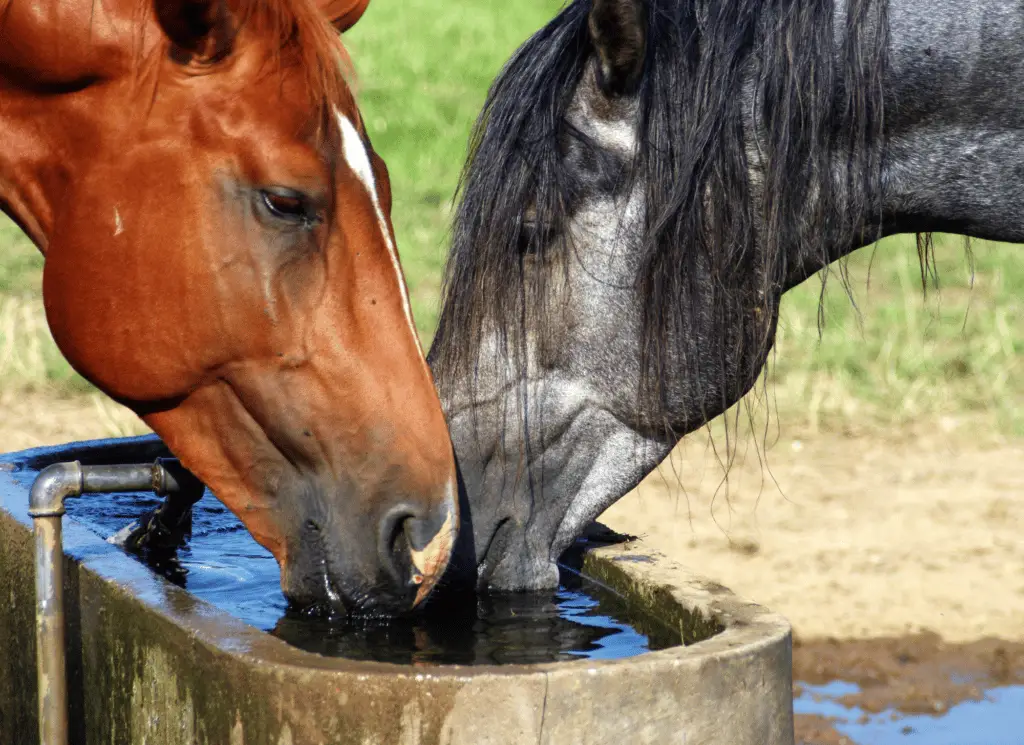
What Is the Likely Outcome If Choke Is Left Untreated?
Choke in horses is almost always serious. In rare cases (and if you are extremely lucky), a horse will dislodge the food particles themselves, though the risk of secondary infection from food particles entering the lungs is always great.
When choke is not treated and the horse can’t swallow the food or expel it, the food blockage will eventually prevent them from swallowing water, which will cause dehydration. Horses with choke dehydrate quickly, weaken, and eventually suffer a heart attack or die of infection. Food rots in their throat, causing abscesses, and septic shock can quickly set in.
Medical Treatment Options for Choke in Horses
Finding a veterinarian immediately is your first course of action when your horse choked. Choke is a medical emergency for your horse, and time can be of the essence. Contact the nearest horse vet immediately, and don’t accept no for an answer, as the vet will need to come out and see your horse as soon as possible to avoid complications.
What to expect when your vet treats your horse includes:
- Checking your horse’s vital signs
- Feeling the throat and chest for signs of a hard object or the site of the food ball or performing an endoscopic exam if the vet has the necessary equipment
- Administering pain and anti-spasmodic (muscle relaxant) medication, like Bute and Buscopan via injection in the vein
- Starting the process of tubing your horse to force the food blockage down the esophagus by inserting a nasogastric tube in the horse’s nostril as a last resort
- Following up with an injection of long-acting antibiotics with a repeat course a few days later to prevent secondary infection once the food blockage has been successfully removed
- Administering a second session of tubing may be required later to further clear their esophagus (for some horses)
Tubing a horse involves inserting a plastic tube or flexible hose down the horse’s throat via their nose. The vet will carefully guide the tube while flushing water down the pipe into the horse’s esophagus.
The tube will force the food blockage further into the stomach so normal digestion can begin, or the tube will break up the blockage, allowing the horse to swallow normally. Tubing can be done with or without sedation, and horses will need to be restrained for the procedure.
If you are waiting for the vet to arrive, you can help your horse by placing the thumb and index fingers of one hand on either side of the esophagus and gently rubbing down toward the horse’s chest. However, do not rub at all if your horse’s neck is very swollen and painful to avoid accidentally rupturing the esophagus.
Following treatment, the horse should be fed only natural grazing for five to seven days, and some vets recommend withholding feed for 12-24 hours to allow the horse’s digestion to settle.
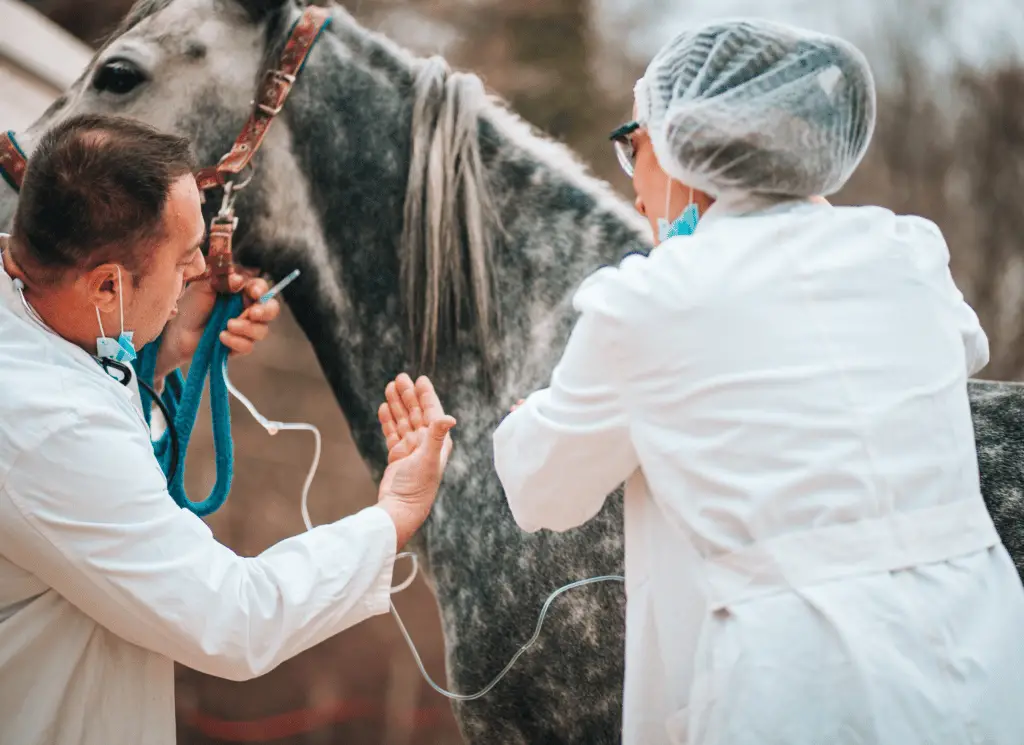
Choke in Horses: How to Prevent It
Preventing choke is about effective equine management being applied at all times. Good horsemanship will guide you to make the right decisions regarding your horse’s care and feeding routine.
Here are a few helpful tips to prevent choke in horses:
- Follow the same feeding time every day.
- Prevent your horse rushing when eating by placing smooth rocks in their food trough.
- Check all feed for the presence of a foreign object that can trigger choke.
- Have your equine dentist give your horse a dental exam for missing teeth or sharp teeth.
- Provide fresh water at all times to keep your horse hydrated.
- Feed beet pulp with water for older horses that may be more prone to choke.
- Feed wet coarse hay to prevent the hay sticking.
- Mix dry feed with a bit of water to ensure the feed doesn’t compact in the horse’s throat.
- Withhold feed when your horse has had a medical procedure that involves sedation or anesthesia as horses are then likely to choke.
Choke in Horses FAQs
Is choke an emergency for horses?
Choke is always cause for emergency action. Never hesitate when your horse is choking, and call your local vet immediately.
What can I do for a horse that chokes?
If your horse has choked, it’s important to keep the horse calm. Don’t try to flush the food ball by syringing water or oil down the horse’s throat as this will likely trigger aspiration pneumonia, where fluid enters the horse’s lungs and causes secondary infections.
Remove access to feed and water to prevent further choking until the vet has seen your horse. Gently walk your horse in hand to help them remain calm and encourage muscle contractions in the throat (which may loosen the food blockage).
If no vet is available, administer an antispasmodic medication like Buscopan (which is the only medicine in this class of drugs licensed for administration to horses) and a pain relief medication like Bute or Finadyne. Gently massage the throat to help the muscles relax.
How long does it take for a choke to resolve on its own?
Choke in horses may resolve on its own. The window of opportunity for this is the first 45 minutes to an hour. If you notice the horse begins to perk up and looks less strained or they manage to cough up the blockage within the first hour, your horse may have been lucky. However, it’s still advisable to contact your vet and have them come out to see your horse.
Choke in horses is a nightmare to witness, and it can lead to death if not treated correctly. When your horse chokes, call the vet immediately. Do what you can to keep your horse calm, prevent them from eating more, and keep them upright to prevent colic induced rolling.
For more advice on calming an anxious horse that may be in pain, read our guide on calming an anxious horse.
Like this post? Save it on Pinterest. Follow me on Pinterest.
